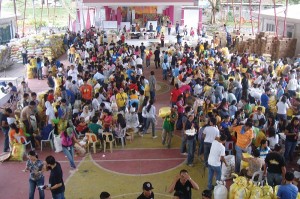NEW BATAAN, Compostela Valley, Philippines – In the predominantly Catholic Philippines, the first signs of Christmas appear months before the actual event: shops playing Christmas carols on their audio loops, brightly decorated trees, neon Santas and reindeers are colorfully displayed outside shops and plazas. It is hard to get away from the holiday over-load.
But in this province, there were no obvious signs that one of the most important festive and religious dates in the country’s calendar, was just days away.
Instead, the scenery was one of utter devastation. Kilometers of crushed banana plantations; downed coconut trees; wrecked houses and public buildings. The damage wrought by typhoon Pablo (International code name: Bopha) has been immense. (As of December 21, the latest death count stood at 1,050 with more than 800 people still listed as missing.)
Philippine authorities estimate that agricultural damage alone stands at P9.7 billion.
Families here have been left dazed and traumatized, trying to make sense of it all. Tens of thousands are still sheltering in temporary evacuation centers. Their biggest immediate problem is getting enough food and water; working out how to repair or build anew their damaged homes; and figuring out a worrying and more challenging problem: how they’re going to get through not just the next few days and weeks, but the coming months and years.
What are they going to do when the emergency response mounted by local and international aid agencies winds down? How are they going to be able to rebuild their lives, with no immediate prospect of getting work?
The most devastated areas had never before experienced a typhoon, despite the fact that the Philippines often experienced 20 typhoons every year.
It was one reason that so many crop plantations have been established in this part of the country, as it was considered to be safe from violent winds and storms that often hit other parts of the Philippines.
“My crops were all destroyed. It will take six years for the coconut plantations to recover,” said 80-year-old farmer Epifanio Apsay Sr., who has been living at an evacuation center here since Pablo lashed into the province.
“We’re very worried about the future. The support we are getting now won’t last long. It will take us years to recover; we don’t have anything. We need support from anyone who can support us, especially to find work,” he said.
International aid agencies such as Oxfam and its four humanitarian partners in the Philippines, who work under the umbrella organization Humanitarian Response Consortium, had responded to the immediate needs of the victims: clean, safe drinking water; temporary latrines in the overcrowded evacuation centers, and spreading awareness about hygiene, as well as handing out shelter, hygiene and water kits.
Families living in evacuation centers in some areas where Oxfam and its partners are working have also received cash grants of P1,500 pesos, allowing them to buy some basic daily necessities over the next few days.
“With this money, I’ll buy some sheets for roofing, some housing materials, medicines and clothes for the children. I’m very happy to get this money,” Marites Oyo, 38, and a mother of five, said.
“We were flooded and our house was totally destroyed. There is nothing left. Farmland was devastated. We work as day laborers and don’t have land of our own. Finding work will be hard,” she added.
Surrounded by families with small bundles of possessions – anything they managed to grab while running – in an open sports stadium, Marites said celebrating Christmas was far from her mind.
“After the typhoon, it doesn’t seem proper to celebrate Christmas. This time we will pray that this kind of thing doesn’t happen again,” she said.
(Editor’s Note: Evacuees in this town managed to celebrate Noche Buena though through food packs earlier distributed by the Department of Social Welfare and Development (DSWD).
Another man sheltering in the same center, 45-year-old Carmelito Gapo, a father of four, snorted when asked the same question.
He used to work as a day laborer on the banana plantations.
“There is no point in celebrating. We have no work and there will be no immediate work in the future. Our Christmas ‘bonus’ was to receive the typhoon,” he said with sarcasm.
But, in a sign of just how religious many were here, he conceded: “Yes, I still go to church to pray. Despite everything, we’re still grateful that we are alive.”
“My children are very understanding. They realize it won’t be Christmas as usual. I’ve explained things to them. In the past, I provided for their needs, but this year, we have nothing. It’s the worst Christmas we faced,” Gapo said.
Others sheltering in the stadium said the same thing.
“We have no money, so the only thing we can do is to pray. It was the hardest ever Christmas for us and New Year will also be very difficult,” 71-year old Gaubiosa Cordovez, said.
Mother of two, Corazon Pedrico, who lost her home and a small store, said she had other things to worry about.
“I don’t know how we will get by now in the future. I lost the store; and I worry how to look after the children. How can they go to school? They don’t have any school uniforms. We lost everything,” she said.
(Caroline Gluck is Oxfam’s roving humanitarian press officer based in Cambodia and a former BBC correspondent. She recently visited Compostela Valley.)
